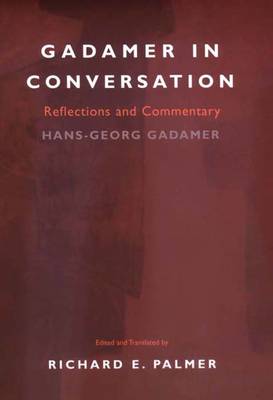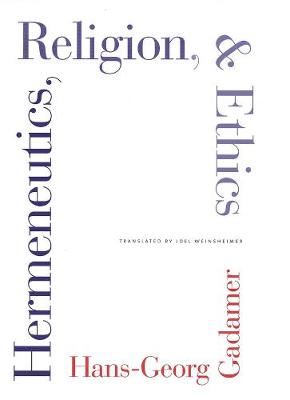Yale Studies in Hermeneutics
2 total works
This volume presents six lively conversations with Hans-Georg Gadamer (born 1900), one of the twentieth century's master philosophers. Looking back over his life and thought, Gadamer takes up key issues in his philosophy, addresses points of controversy, and replies to his critics, including those who accuse him of having been in complicity with the Nazis. A genial and direct conversationalist, Gadamer is here captured at his best and most accessible. The interviews took place between 1989 and 1996, and all but one appear in English for the first time in this volume. The first three conversations, conducted by Heidelberg philosopher Carsten Dutt, deal with hermeneutics, aesthetics, and practical philosophy and the question of ethics. In a fourth conversation, with University of Heidelberg classics professor Glenn W. Most, Gadamer argues for the vital importance of the Greeks for our contemporary thinking. In the next, the philosopher reaffirms his connection with phenomenology and clarifies his relation to Husserl and Heidegger in a conversation with London philosopher Alfons Grieder.
In the final interview, with German Nazi expert Dorte von Westernhagen, Gadamer describes his life as a struggling young professor in Germany in the 1930s and refutes accusations of his complicity with the Nazis. These conversations are a lucid introduction for readers new to the philosopher's thought, and for experts they present an invaluable commentary on Gadamer's most important themes.
In the final interview, with German Nazi expert Dorte von Westernhagen, Gadamer describes his life as a struggling young professor in Germany in the 1930s and refutes accusations of his complicity with the Nazis. These conversations are a lucid introduction for readers new to the philosopher's thought, and for experts they present an invaluable commentary on Gadamer's most important themes.
In the years shortly before and after the publication of his classic Truth and Method (1960), the eminent German philosopher Hans-Georg Gadamer returned often to questions surrounding religion and ethics. In this selection of writings from Gesammelte Werke that are here translated into English for the first time, Gadamer probes deeply into the hermeneutic significance of these subjects.
Gadamer raises issues of importance to ethicists and theologians as well as students of language and literature. In such outstanding essays as "Kant and the Question of God," "Thinking as Redemption: Plotinus between Plato and Augustine," and "Friendship and Self-Knowledge: Reflections on the Role of Friendship in Greek Ethics," Gadamer discusses the nature of moral behavior, ethics as a form of knowing, and the hermeneutic task of mediating ethos and philosophical ethics with one another.
Gadamer raises issues of importance to ethicists and theologians as well as students of language and literature. In such outstanding essays as "Kant and the Question of God," "Thinking as Redemption: Plotinus between Plato and Augustine," and "Friendship and Self-Knowledge: Reflections on the Role of Friendship in Greek Ethics," Gadamer discusses the nature of moral behavior, ethics as a form of knowing, and the hermeneutic task of mediating ethos and philosophical ethics with one another.

